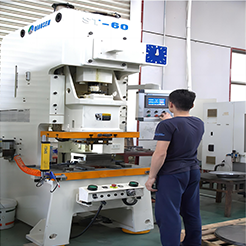
Advancements in Metal Processing: Shaping Industries
Metal processing, a cornerstone of industry, encompasses diverse techniques like metal spinning, casting, forging, machining, and welding, transforming raw materials into functional components.
1: Fundamentals of Metal Processing
Metal spinning
Metal spinning uses advanced and unique process technology to roll the metal sheet into shape using a CNC spinning machine with a set spinning trajectory program. When encountering high-strength metal sheets, the hot spinning process can be used! It has the advantages of efficient R&D and a short cycle time while reducing material waste and process steps.
Casting
Casting molds molten metal, leveraging advanced simulations for intricate designs, enhancing efficiency, and reducing material waste.
Forging
Forging shapes metal through compressive force, employing modern techniques for high-strength components in automotive and aerospace industries.
Machining
Machining removes material with precision, propelled by CNC technology, ensuring accuracy and repeatability in manufacturing.

Welding
Welding fuses metals using cutting-edge methods like laser and electron beam welding, crucial for durable joints in critical applications.
2: Innovations Driving Metal Processing
Additive Manufacturing
3D metal printing reshapes production, enabling complex geometries with reduced waste and revolutionizing design and customization.
Smart Automation and Robotics
Automation and robotics optimize tasks, ensuring precision and safety in intricate metal proces operations.
Advanced Materials and Alloys
Exploration of new alloys and composite materials yields superior properties, meeting evolving industrial demands for strength and durability.
Nanotechnology in Metal Processing
Nanotech applications enhance metal properties, offering unprecedented strength, conductivity, and surface characteristics.
Challenges and Future Outlook
Sustainability and Environmental Impact
Reducing energy consumption, optimizing recycling, and minimizing waste are vital for sustainable metal proces practices.
Industry 4.0 and Digital Transformation
Integration of IoT and data analytics will revolutionize metal proces, optimize efficiency, and enable predictive maintenance.
Metal Processing Conclusion
Metal processing, a pivotal force in industrial progress, intertwines technological innovation with sustainability imperatives. Its evolution continues to sculpt a future where precision, efficiency, and eco-consciousness harmoniously converge to drive the global industry forward.
With advancements in metal spinning, spanning casting, forging, machining, welding, and the integration of cutting-edge technologies like additive manufacturing, automation, and nanotechnology, the landscape of the metal process has undergone a profound transformation. This evolution isn’t merely confined to techniques but extends to materials themselves, ushering in an era of robust alloys and composites.
Challenges, notably sustainability and digital integration, stand as impetuses for continual refinement, pushing the boundaries of what’s achievable. As Industry 4.0 beckons, the synergy between smart technologies and traditional craftsmanship propels metal processing into a future where efficiency, precision, and sustainability are not mere aspirations but ingrained realities.
This convergence signifies a future where the metal process remains not just a fundamental pillar but a driving force steering industries toward unparalleled heights of innovation and global progress.
driven by technology and sustainability, remains pivotal to industrial growth, shaping a future of innovation and resilience.

Advancements in Metal Processing: Shaping Industries

Hot Metal Spinning Process

Punching machine processing service

Centrifugal fan impeller internal welding robot

Lampshade metal polishing process



